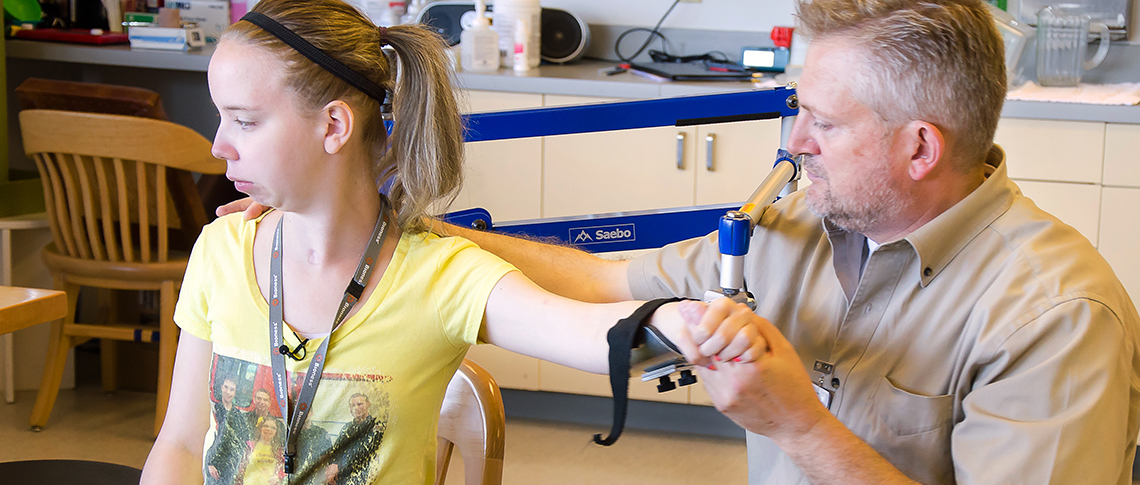
November 23, 2015

Twenty-year-old Renaye Wade, left, works with her Occupational Therapist Don Simoneau during a rehabilitation therapy session. Wade, who suffered a severe brain injury in a motor-vehicle accident two years ago, was honoured at the 10th annual Courage Awards Ceremony on Nov. 12 by the Glenrose Rehabilitation Hospital Foundation in Edmonton.
Story by Kerri Robins; Photo courtesy Raylene Pearson
It takes equal parts courage and hard work to bounce back from a life-changing injury — and celebrating exceptional patients who embrace their rehab journey is the goal of the Glenrose Rehabilitation Hospital Foundation’s 10th annual Courage Awards, which were held at the Glenrose Rehabilitation Hospital on Nov. 12.
This year’s recipients are: stroke survivor Nicholas Mudryk, 15; spinal-cord injury survivor Lincoln Grayson, 14; brain injury survivor Renaye Wade, 20; and Jerry Wilson, 78, who lives with both visual and hearing impairments.
Nominated by Glenrose staff — including physicians and nurses as well as physical, occupational and speech therapists — these patients have remained brave and positive throughout their lengthy rehabilitation.
Mudryk was an aspiring goalie, only 14 years old, when he suffered a stroke. Facing off against his debilitating condition, he fought hard to return to the ice one year later — and made the midget AA Strathcona Warriors team.
“Hard work pays off sometimes and it gets you to where you want to go,” says Mudryk.
Former wrestling champ Lincoln Grayson was 13 when he suffered a spinal cord injury in a bicycle accident last year. Overcoming powerful odds, this teen quadriplegic has now signed up for a new sport — power chair soccer — in hopes of inspiring others to do their best.
Grayson has also shot a series of Christmas videos — entitled 12 Reasons I’m Thankful — and says: “I’m grateful that my accident wasn’t too severe and grateful for the wonderful health care in Alberta.”
Wade turned her ordeal into a positive outcome when she succeeded in having the fines increased for distracted driving in Alberta. The stalled car Wade was in two years ago was struck by a semi-truck, leaving her in a coma for 34 days with a cracked pelvis, broken jaw and severe brain injuries.
Fighting back, Renaye created RADD (Renaye Against Distracted Driving) and her mother, Tammy Wade, says she couldn’t be prouder of her: “I always knew she’d change the world.”
Firefighter Jerry Wilson received a salute from the Edmonton Fire Services Honour Guard at the ceremony, in recognition of his battle with hearing and sight loss. An explosion in 1975 caused him to eventually lose his sight, hearing in both ears, and eventually his career. “It’s like being in a void, a vacuum, and you can’t even hear yourself talk,” says Wilson.
He received two cochlear implants — electronic devices surgically placed in the inner ear. While most patients have one ear done at a time, Wilson chose to have both implants at once.
“It took a huge amount of courage to do this because for six weeks after the hook-up of the equipment, there is no hearing,” says Wilson’s audiologist, Kathy Packford, of Alberta Health Services (AHS).
Wilson’s silence lasted seven weeks until the implants could be activated and he could hear again for the first time in several years. “It’s a whole new outlook on life,” says Wilson, and he credits his years as a firefighter that prepared him for his journey, teaching him to trust his team and be brave.
The Glenrose Rehabilitation Hospital Foundation, together with the Glenrose Rehabilitation Hospital and Global News Edmonton, celebrate and honour a handful of courageous patients at the awards ceremony every year.
The categories are pediatric rehabilitation, adult rehabilitation and older adult rehabilitation.
Wendy Dugas, President and CEO of the Glenrose Rehabilitation Hospital Foundation, says she’s inspired by the many patients she meets through her foundation work.
“Many of them go through months of intense rehabilitation,” says Dugas.
“It’s a struggle for them to gain back as much independence as possible — and many of them have remarkable journeys that inspire other patients.”
For more information please visit glenrosefoundation.com